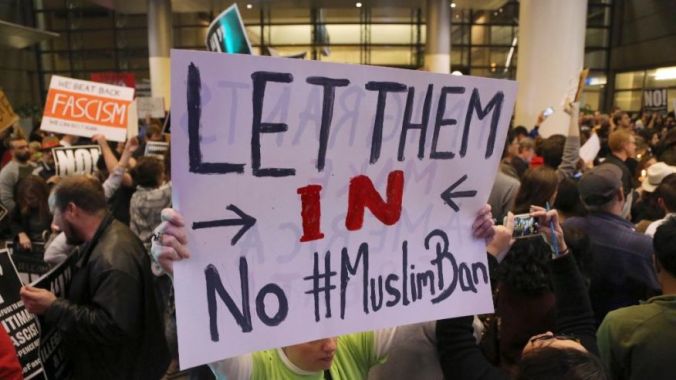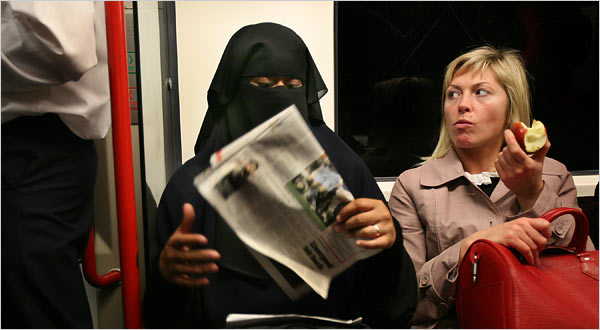Most of the American population is aware of what happened on January 27th, 2017. The Trump administration made a bold move banning 7 countries (Iraq, Syria, Iran, Libya, Somalia, Sudan and Yemen) from traveling to the United States for ‘security’ purposes. This was followed by mass protests across the United States at international airports. The people responded with anger at the administration since refugees, friends and family members were being held at airports and told they were no longer granted access after they went through the process of getting to the United States. Travel Ban Protests

This obviously was not the end. In less then 24 hours, this ban became one of the most controversial actions of the Trump administration. Many people throughout our country stated this ban was not only discriminatory but also unconstitutional. Thanks to the checks and balances system of our government, the Judiciary branch immediately challenged the President. Many courts across America blocked sections of the travel ban – their reasoning? Unconstitutional. Many people agreed that banning people violates their Due Process and Equal Protections within the Constitution.
This ban seemed like a rush action that was done for publicity within the President’s first 100 days – which typically is focused upon by the media to see if the President follows through with certain campaign trail promises. Throughout Trumps campaign, he constantly dehumanized the entire population of Muslims and pushed them into one stigmatizing category – terrorists. In Trump’s perception – this ban was going to protect citizens from terrorism but did not think of the consequences that would come out of it. Many innocent people were barred from the United States, even some of our fellow classmates and workers who hold legal green cards. This document lumped an entire population and claimed they were all potentially dangerous. Using this wording is extremely dangerous because it puts a stigma onto an entire group of people who are attempting to make an honest living. 
As I stated earlier, the judiciary branch began to intervene. After making it’s way through many courts on February 16th, Donald Trump promised to change certain parts of the travel ban in accordance to federal court decisions. On March 6th, the new travel ban was announced. This new list excluded Iraq from the original countries banned but continued to ban refugees and foreign nationals from entering the United States. This is where it escalated really quickly…
US District Court Judge Derrick Watson of Hawaii agreed to hear a case against the travel ban, and in the meantime BANNED the ban from being implemented until the case was resolved. The Supreme Court eventually took over this case and on June 26th they ruled that some aspects of the ban could go into affect until they could hear the case. People who were still allowed into the United States from these countries during this time are required to have a visa or a bona-fide relationship with a person or entity in the United States. This ban does not even allow you into the United States if you are a grandparent. The Supreme Court is not hearing the case until the fall term though, so the ban might be over before the justices are even given a chance to decide.
So what does this mean for social workers? This ban is dehumanizing. Even the title of the executive order “Protecting the Nation From Foreign Terrorist Entry Into The United States” is giving the people the idea that Muslim = terrorist. It is giving everyone a false perception of people who are themselves trying to escape war. They are attempting to make their lives better and get the basic needs to live which is a human right. We are ignoring a humanitarian crisis, and barring people for no legitimate reason. The United States has not experienced a terrorist attack from these foreign nations in 40 years! Most recent terrorism in our country has been caused by our own citizens – which would not have been prevented by this ban if it was in place during those attacks. As social workers, we will be working with and for vulnerable people. This is a very, very scary time for Muslims in this nation as their morality is being questioned by the government. If anything, Muslims in this country have a right to fear for themselves more then we have a right to fear of them. It is social workers responsibility to stand up for social justice. It is an injustice that Muslims are not given the free religious liberties that every other citizen has a right over. The government constantly is discriminating against them based on their religion – which this ban entails. Another value of our profession is competence, and not only for ourselves but spreading knowledge to others. As a profession, we should stand up and fight when we see injustice and hate. Hate crimes are on the rise as we can see in this report: Hate Crimes Against Muslims, which shows the reality of their life. It’s time to work together as a population to realize their is no direct threat in an entire race, ethnicity or religion. It is INDIVIDUALS who decide to spread hate. It is our job to make sure that we are protecting the human rights and religious rights of groups that do not define themselves or their moralities with those individuals.
Highly recommend watching: Travel Ban Explained
For more information on this subject, visit the following links:
CNN: Supreme Court allows part of travel ban to take effect
Supreme Court Document on Travel Ban
Clear explanation and great thoughts. 40 YEARS since a terrorists attack from anyone belonging to these countries! It’s amazing how rhetoric used by the media can shape public perception to demonize certain populations.
LikeLike
“If anything, Muslims in this country have a right to fear for themselves more then we have a right to fear of them.”
Wow. Great post, Ashley! You’re very articulate and clearly passionate. You did a great job of highlighting this issue and its impact on people groups, families and individuals (seriously, banning grandparents?). As a country that [claims to] champion freedom, justice and autonomy, this is so broken. No one would ever dare to claim that one American terrorist represents the moral standing all of the people in the U.S…. yet the travel ban justifies this same mindset.
LikeLike
Asking whether the travel ban is unconstitutional, in my point of view, is the $1,000,000 question. I do believe that such decision limits the liberties or opportunities of many because of the anticipated behavior of a few. Furthermore, denying individuals and refugees of six majority-Muslim countries is not only a violation of the Constitution but a violation of the core values of the NASW code of ethics. Individuals and refugees who are being denied visa or entry to the U.S. are also denied of their dignity and worth, meaning that each person is not being treated in a caring and respectful fashion. The Supreme Court ruling, which supposed to be a national security rationale is a set back for the cause of liberty and justice for all.
LikeLike
This was so well written. I think that your point about this ban perpetuating the idea that Muslim=terrorist is so important. Trump’s rhetoric instils fear into wrongfully educated/ uneducated minds that we should be fearful of an entire religion, or of entire countries!! Its outrageous. Thanks for sharing!!!
LikeLike
Great post, Ashley! I appreciate how you included the implication for stigma. The travel ban sends such a symbolic and harsh statement that a certain population should be excluded because of a lazy assumption.
LikeLike
I really enjoyed reading this, so thank you! This country has developed an unrealistic and irrational fear of muslims. What I can’t stand is how this ban has literally ripped families apart. I can’t imagine what that would be like to go through that. It is crucial that we continue to fight ignorance. Muslims are peace loving individuals who deserve the freedom to comfortably practice their religion in this country. They should feel just as welcomed as the person born here. Well done!
LikeLike
This post is great! I really enjoyed how you summarized what has happened regarding the Muslim ban. That is definitely the question that we will all have our eyes on come the fall: whether SCOTUS will determine the constitutionality of the ban. It’s crazy to me that grandparents are not considered to have a “bona fide” relationship. I don’t understand how it is within the government’s power to determine what is a family and what is not. I also loved how you talked about the impact this ban has on social workers, and how it is our job to work toward equality and justice. We must hold the government accountable when it does things such as discriminate against a religion or a group of people. And we must also work to protect the human rights of all individuals. Great blog post!
LikeLike